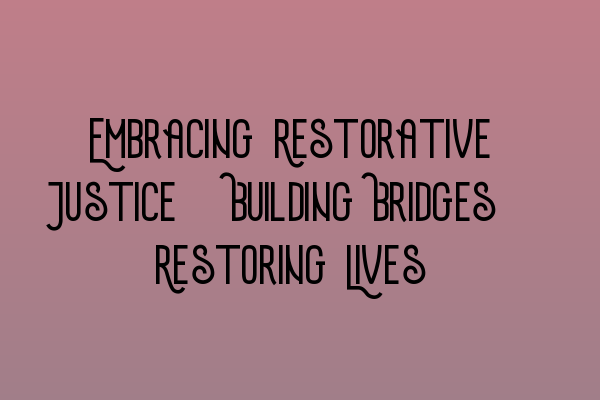Embracing Restorative Justice: Building Bridges, Restoring Lives
Welcome to the official blog of SQE Criminal Law & Practice Law UK! Today, we would like to discuss an important topic that holds great significance in the realm of criminal justice: restorative justice. Restorative justice is a philosophy and process that aims to actively involve all parties affected by a crime in seeking solutions and repairing harm. By embracing this approach, we have an opportunity to build bridges between victims, offenders, and communities while simultaneously restoring lives.
Restorative justice is a progressive and transformative alternative to traditional punitive systems. It acknowledges that crime is not just an act against the state, but also an act against individuals and communities. Instead of focusing solely on punishment, restorative justice focuses on making amends, healing wounds, and addressing the root causes of criminal behavior.
The Key Principles of Restorative Justice
In order to fully understand the potential of restorative justice, it is essential to familiarize ourselves with its core principles:
- Inclusive: Restorative justice involves all parties affected by the crime, including victims, offenders, and the community. It fosters dialogue and encourages active participation, enabling individuals to have a voice in the process of seeking justice.
- Voluntary: The participation of all parties involved in restorative justice processes is entirely voluntary. This ensures that individuals feel comfortable and empowered in their decision to engage.
- Accountability: Restorative justice promotes accountability by encouraging offenders to take responsibility for their actions. Through open and honest dialogue, offenders can understand the impact of their behavior and work towards making amends.
- Reparative: The focus of restorative justice is on repairing the harm caused by the crime. This may involve offering an apology, providing restitution, or undertaking specific actions that address the needs of the victim and the community.
- Empowering: Restorative justice empowers victims by providing them with an opportunity to express their feelings, ask questions, and actively participate in the process of finding resolution. It enables them to regain a sense of agency and control over their lives.
By embracing these principles, restorative justice offers a unique and compassionate approach to addressing criminal behavior. It recognizes the humanity of all parties involved and promotes healing, growth, and transformation.
The Benefits of Restorative Justice
Restorative justice holds numerous benefits, both for individuals affected by crime and for communities as a whole. Some of the key advantages include:
- Healing and Closure: Restorative justice provides victims with an opportunity to share their experiences, be heard, and receive answers to their questions. This process can aid in the healing journey and provide a sense of closure.
- Reduced Recidivism: Studies have shown that restorative justice practices are effective in reducing recidivism rates. By addressing the underlying causes of criminal behavior and fostering empathy, offenders are less likely to reoffend.
- Community Engagement: Restorative justice actively involves the community in the justice process. By engaging community members as mediators, supporters, or witnesses, it fosters a collective responsibility for reconciliation and crime prevention.
- Empathy and Understanding: Through open and honest dialogue, restorative justice promotes empathy and understanding between victims and offenders. It humanizes all parties involved and encourages a deeper appreciation of each other’s perspectives and experiences.
- Cost-Effective: Restorative justice programs have proven to be cost-effective compared to traditional punitive measures. By focusing on mediation and dialogue rather than lengthy court proceedings, it saves both time and resources.
At SQE Criminal Law & Practice Law UK, we believe that restorative justice is an essential component of a fair and compassionate criminal justice system. By embracing this approach, we can build bridges between individuals, repair the harm caused by crime, and restore lives.
If you are interested in learning more about the SQE exams and criminal law practice, we invite you to check out our SQE 1 Practice Exam Questions and SQE 1 Practice Mocks FLK1 FLK2 articles. We also offer comprehensive SQE 2 Preparation Courses and SQE 1 Preparation Courses to help you achieve your legal career goals. Stay updated with the latest SRA SQE Exam Dates and take a step towards a fulfilling career in criminal law.
Thank you for reading, and we look forward to guiding you on your legal journey!
